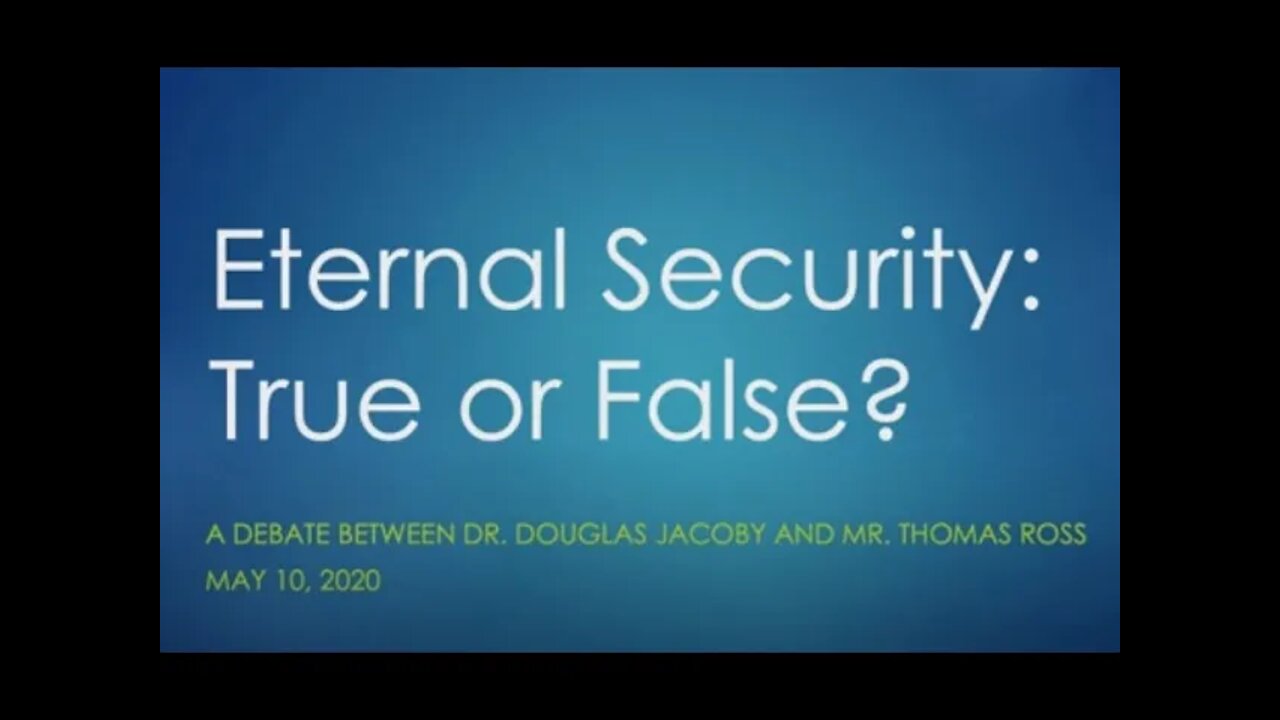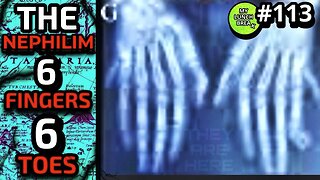Premium Only Content

Douglas Jacoby & Thomas Ross Debate Eternal Security: Can Those Truly Born Again Perish Eternally?
Douglas Jacoby and Thomas Ross debated the doctrine of eternal security. The specific discussion topic was "Those truly born again can never finally and eternally perish."
Thomas Ross made two arguments for the proposition:
1.) God preserves His people
2.) God causes His people to persevere
He argued for “once saved, always saved" and said that salvation always includes both deliverance from the penalty and power of sin. God always saves His people not only from hell fire but also from the control of sin. Regeneration is a radical transformation within the Christian or saint that is like the change from the control of Satan to the Lordship of Christ in the coming kingdom (Matthew 19:28; Titus 3:5). He argued that God saves by grace alone through repentant faith alone specifically for the purpose of giving His people eternal security (Romans 4:16). Not all who profess Christ are secure, but those truly born again are eternally secure because of:
1.) Unchanging and eternal election (Romans 8:33; Ephesians 1:4; 2 Timothy 1:9; Acts 13:48). All believers are personally elected to salvation (Romans 16:13) and cannot be lost.
2.) Divine predestination (Ephesians 1:5-6; 11-12). All who are predestinated to be conformed to Christ's image and have a glorified resurrection body will be justified and will be glorified (Romans 8:28-39)--none of them is lost.
3.) Christ’s High Priestly ministry and intercession for all His people (Romans 8:34). The Lord Jesus is an Advocate who effectually saves to the uttermost (Hebrews 7:25). When a Christian sins, he does not lose salvation because at the very moment of his sinning Christ intercedes on his behalf (1 John 2:1-2). Christ's High Priestly advocacy guarantees that they will be sanctified (John 17:17) and that their faith will not fail (Luke 22:32). Christ prays for all true believers in John 17, and part of His prayer is: "Father, I will that they also, whom thou hast given me, be with me where I am; that they may behold my glory, which thou hast given me: for thou lovedst me before the foundation of the world" (John 17:24). Were even one of His people to perish forever, Christ's prayer would be a failure. However, the Father always answers Christ's prayers (John 11:42) just as He always answers when Christians pray in His will (1 John 5:14-15). Jesus always prays in the Father's will, so His prayer for His saints is certain to be answered; denying eternal security means the Father rejects His Son's prayer.
4.) The nature of justification; at the very moment Christ's blood washes away his sins, he is "perfected for ever" (Hebrews 10:14), as judicially sinless as the Savior Himself.
5.) Salvation is not by works (Galatians 2:16; Ephesians 2:8-9). God's people do not save themselves nor keep themselves saved. If salvation were based on obedience, everyone would lose it because nobody perfectly obeys (Matthew 5:48; James 2:10).
6.) The seal of the Holy Spirit (Ephesians 1:13-14). The Spirit is the earnest or downpayment guaranteeing the Christian's future inheritance.
7.) Many plain promises of eternal security (John 4:13-14; 10:27-30). John 4 contrasts physical water and the spiritual water Christ gives. One must continually drink physical water or one will thirst again, but with the water the Lord Jesus gives one drink guarantees he can never perish; the strongest negation in the Greek language is used. In John 10:27-30 Christ promises His sheep will never perish and that they will follow Him. 1 Corinthians 3:10-15 teaches that believers who sin lose reward, not eternal life.
Dr. Ross argued that saints persevere because Scripture specifically says that those who do not persevere were never born again (1 John 2:19) and those born again cannot continually sin because God's seed remains in them (1 John 3:6-9).
Dr. Jacoby responded by arguing that Hebrews 6 & 10 teach those born again can commit apostasy. Once salvation is lost it can never be regained. Those with knowledge of Christ turning back (2 Peter 2:20-22), Christ's parable of the unforgiving servant (Matthew 18), and the blasphemy against the Holy Spirit show salvation can be lost. It is not clear how many sins one must commit before being lost, but at a certain point one's forgiven sins become unforgiven. Jacoby argued that Christ's prayer in John 17 is not literally answered, but the Father gives the Son something better than what Christ prayed for. Election and predestination are usually corporate. Security proof texts are unclear.
Ross replied that those who fall away in Hebrews professed but never possessed salvation. In 2 Peter 2 the people were only outwardly washed but were still pigs and dogs, not sheep. People who characteristically do not forgive are lost, but details of parables are not the way to determine doctrine. Only the unregenerate can commit the blasphemy against the Holy Ghost. Having people for whom Christ prayed burn in hell is not better than actually answering the Son's prayer.
-
 10:42:19
10:42:19
Reolock
11 hours agoWoW Classic Hardcore (LVL 60) | RAID DAY | Rumble FIRST HC Raid
34.2K1 -
 3:10:03
3:10:03
Barry Cunningham
8 hours agoTRUMP WEEKEND BRIEFING! MORE WINNING...MORE LEFTIES LOSING IT!
33.4K21 -
 2:20:09
2:20:09
Tundra Tactical
7 hours ago $1.46 earnedIs Trumps Executive Order A Second Amendment Wishlist???: The Worlds Okayest Gun Live Stream
17.5K1 -
 2:33:51
2:33:51
John Crump Live
12 hours ago $10.41 earnedSaturday Night Main Event!
56.1K5 -
 13:57
13:57
TimcastIRL
18 hours agoTrump NUKES IRS After DOGE Investigation, OVER 9000 Employees To Be FIRED
86.1K160 -
 13:35
13:35
Russell Brand
11 hours agoPFIZER JUST MADE THEIR NEXT MOVE AND EXPERTS ARE TERRIFIED
107K217 -
 1:15:57
1:15:57
Victor Davis Hanson Show
21 hours agoOver Here, Over There: the Russo-Japanese War and Trumpian Peace Policy
48.6K30 -
 23:55
23:55
MYLUNCHBREAK CHANNEL PAGE
1 day agoThe Nephilim Are Here
80.3K68 -
 1:00:58
1:00:58
Break The Cycle w/ Joshua Smith
8 hours ago $1.34 earnedBreak The Cycle Ep. 247: Funny Guys w/ Robbie "The Fire" Bernstein
20.8K1 -
 41:26
41:26
TheTapeLibrary
23 hours ago $9.16 earnedThe Disturbing Horrors of the Trans-Allegheny Lunatic Asylum
53.2K4